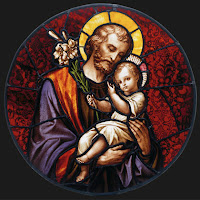 |
| Christ, the Strength of the Martyrs! |
PRAISED Be Jesus, Mary, and
Joseph!
Last week, Simon received the
name Peter. Today, he is called Satan. Last week, he was praised for receiving
revelation from the heavenly Father. Today, he is rebuked for thinking not as
God does but as human beings do. Simon Peter was rebuked for opposing the plan
of the Lord to go to Jerusalem in order to suffer and die in order to be raised
up. Many of us might object: Was it wrong for St. Peter to desire for the
Lord’s safety and well-being? Apparently, we find nothing wrong with what Peter
said. But this is because we also are thinking as humans do. We are not thinking
as God does.
The Lord called Peter “Satan”
because Peter was opposing the mission of Jesus to suffer and die on the Cross.
He was acting as an “enemy of the cross”. In his letter to the Philippians, St.
Paul spoke about the enemies of the Cross: “For, as I have often told you
before and now tell you again even with tears, many live as enemies of the
cross of Christ. Their destiny is destruction, their god is their stomach, and
their glory is in their shame. Their mind is set on earthly things.” (Phil. 3:18-19) To detest the Cross is to be
its enemy.
To the Lord, the Cross plays an
integral part of his mission. To him, it is the only means to enter into his
glory. Thus, he makes it a requirement for discipleship. Anyone who wishes to
be his disciple must embrace the Cross: “Whoever wishes to come after me must
deny himself, take up his cross and follow me.” The doctrine of the Cross
opposes the way of the world which is the way of self-preservation: “For
whoever wishes to save his life will lose it but whoever loses his life for my
sake will save it.” The way of the world is self-preservation through
accumulation. The world regards suffering as evil which should be avoided. We
are taught that we must accumulate as much as we can in order to shield
ourselves from suffering. But the Lord himself tells us that the rejection of
the Cross is the path to destruction: “What profit would there be for one to
gain the whole world and forfeit his life? Or what can one give in exchange for
his life?”
St. Teresa Benedicta of the Cross
wrote: “The entirely comfortable being-at-home in the world, the satiety of
pleasures that it offers, the demands for their pleasures and the
matter-of-course consent to these demands – all of this is darkness in God’s
eyes and incompatible with the divine light. It has to be totally uprooted if
room for God is to be made in the soul. Meeting this demand means engaging in
battle with one’s own nature all along the line, taking up one’s cross and
delivering oneself up to be crucified.” (Edith Stein, The Science of the Cross,
47.)
The path to life is the path of
self-denial. The way of the Cross is the way of discipleship. But what does it
mean to deny oneself and to take up the Cross? St. John of the Cross explains
this through maxims. He said: “Take care that your inclination is ever
directed: not toward the easier, but toward the more difficult; not toward the
pleasant, but toward the unpleasant; not toward the restful, but toward the
troublesome; not toward the more, but toward the less, not toward what brings
you more joy, but what brings displeasure; not towards what prepares
consolation for you, but toward what makes you disconsolate; not toward the
higher and more valuable, but toward the lowly and insignificant; not toward
what wants to be something, but toward what wants to be nothing. Seek not what
is the better in things, but what is worse. Demand for the sake of Christ to
enter into total denudation and freedom and poverty from all there is in the
world.” (CWJC, A.1.13.6-8.)
Jesus, I trust in you. O Mary
conceived without sin, pray for us who have recourse to thee!











